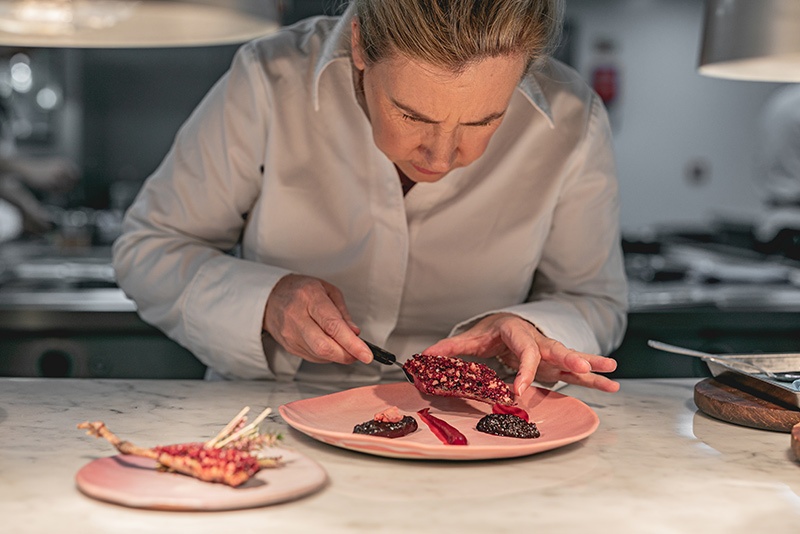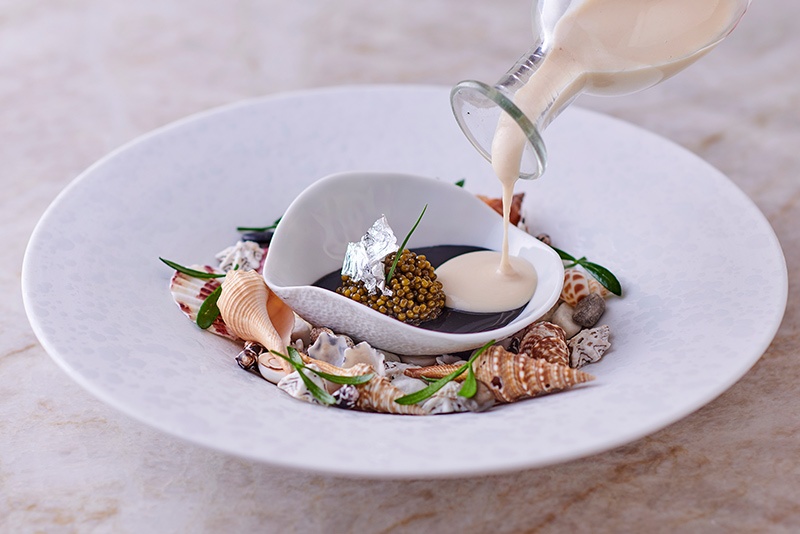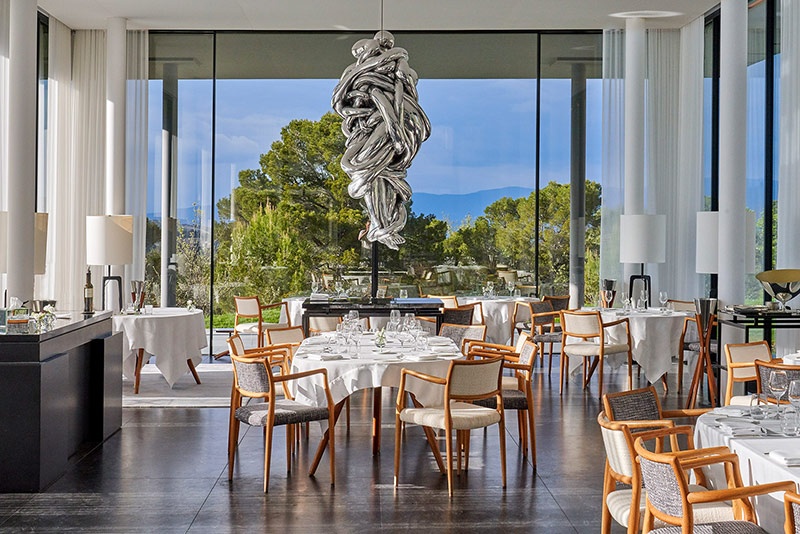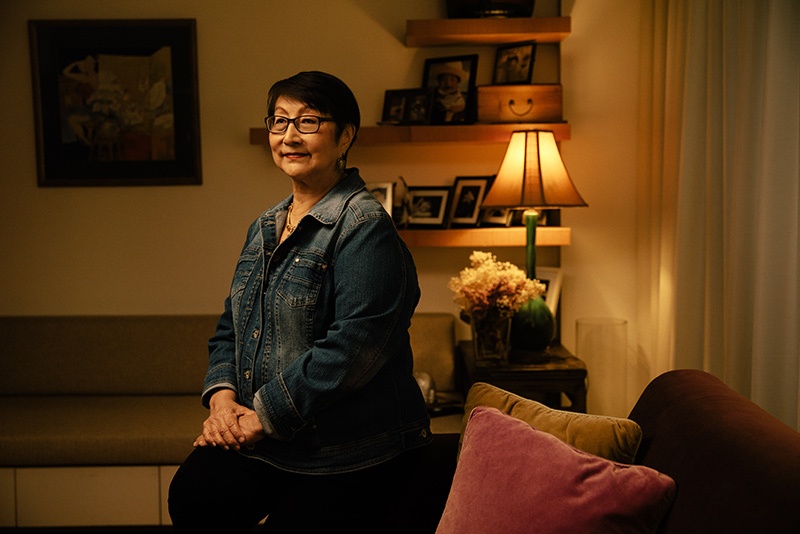Hélène Darroze and Violet Oon are two culinarians beloved by their countries, yet hail from different generations and cultures—one has reached the pinnacle of fine dining with five Michelin stars to her name, the other a legend in the Singapore food scene, who many regard as the grand dame of Peranakan cuisine. Since Oon used to be an erstwhile food journalist and critic, it will only be befitting that she gets to ask the questions. Last month, Darroze and Oon connected via Zoom to talk about how women cook instinctively, adjusting to the twists and turns of the pandemic, and what lies ahead.
Hélène Darroze Interviewed by Violet Oon
VIOLET OON: Pleased to meet you, Hélène. Congratulations on receiving five Michelin stars this year. It must have been the best news in the middle of this pandemic, right?
HÉLÈNE DARROZE: Oh yeah, for sure. It was something completely unexpected because I didn’t think about Michelin stars. I was more concerned about the financials, my staff, what to do with the business—of course, when we heard the news it was like…
VIOLET: Like a bolt of lightning.
HÉLÈNE: Exactly. A bolt of happiness, something incredible in this strange time.
VIOLET: It must have been so exciting for your teams in London and Paris.
HÉLÈNE: I was in Paris when I heard the news, but I couldn’t travel to London because of the lockdown. It was very frustrating not being there to celebrate with them in person. Our restaurants were closed during the time when we received the Michelin stars too.
VIOLET: Oh dear.
HÉLÈNE: When we had the opportunity to reopen Marsan, Paris would be empty: everyone would be on vacation and there were no tourists, so it didn’t make sense to reopen the restaurant.
VIOLET: By the way, I was first in Paris in 1963 before you were born. I have a picture of me in Montmarte holding a baguette. My parents and I lived in London then. We drove through the Loire Valley and Paris.
HÉLÈNE: Oh là là.
VIOLET: Subsequently, in 1980, I went on a three-week pilgrimage from Bordeaux to Paris to Hennessy in Cognac as a food writer. I met Paul Bocuse, Jean Vettard as well as Michel Guérard.
HÉLÈNE: Michel Guérard is one of my mentors.
VIOLET: I know... I wanted to find out about French food and nouvelle cuisine. I had a cooking class from Mr Gaston Lenôtre and he taught me how to bake a cake. I have a love affair with France.
HÉLÈNE: I can imagine.
VIOLET: You come from a family of culinarians, right?
HÉLÈNE: Exactly. I’m the fourth generation.
VIOLET: Are you the first woman in these four generations?
HÉLÈNE: Not really, because my grandmother used to cook alongside my grandfather and I learnt a lot from her.
VIOLET: What was your earliest memory of food? I read that you used to make an apple tart for your family.
HÉLÈNE: Yeah, when I was a kid that was the first dish I made. My first food memory was having early Sunday dinner with my whole family; 20 of us around the table and my grandmother used to cook a corn-fed roasted chicken with French fries in duck fat. My father and uncles used to work with my grandfather in the restaurant, so we couldn’t have lunch together and dinner was the only time. It was not only about the food and the quality, but also being around family. Now when I eat roasted chicken, it’s probably the best food for me.
VIOLET: Sentiment plays a lot in the love of food, especially family food, as it brings back memories of happiness. I wrote a cookbook called A Singapore Family Cookbook. Every family should write their own cookbook because they don’t realise what they eat is quite unique. What happens is that when they want to learn, their grandmother is too old and they regret it, you know?
HÉLÈNE: Exactly. I wrote a book documenting the cuisine and heritage of my grandmother.
VIOLET: That’s lovely. In my time, when I wrote about food, women were not so much in the kitchen. It was very much a men’s area and they had to go to formal school, with apprenticeships. But at the same time, in America, Alice Waters started the organic movement, and it came from a woman’s instinct. When I went to Australia, there were amazing women chefs like Stephanie Alexander and Maggie Beer, who in her Pheasant Farm, grew all their own produce and farmed pheasants. So, in a way, women have a more instinctive side, when it comes to cooking. Is that what your experience was as well?
HÉLÈNE: Totally. I didn’t go to culinary school. I went to university. I was a student in the middle of the 80s, and a good student cannot go into the kitchen. You have to go to university. It’s completely crazy to have that kind of mentality. And during that period, when you are a woman, you are not the chef—you cannot be a chef. I thank Mr Ducasse [Alain] who pushed me to go into the kitchen, and when I decided to be a chef, I didn’t have a lot of technique. But because of my childhood background and spending time with Alain Ducasse, I cook a lot with instinct and emotions, much more than technique. The technique comes after. It’s probably completely opposite of how men cook.
 Hélène Darroze plating at the pass in her three-Michelin-starred restaurant at The Connaught.
Hélène Darroze plating at the pass in her three-Michelin-starred restaurant at The Connaught.
VIOLET: Yeah.
HÉLÈNE: Men want to show their technique first, they want to prove something. Perhaps thereafter, they will put an emotion on it. I think I have a very feminine approach because what I want to give is a little bit of myself—it’s not technique, just a little bit of what I feel.
VIOLET: So would you say that the technique is a tool, but not the purpose?
HÉLÈNE: Completely.
VIOLET: Actually, growing up in a family like yours, you do see a lot of technique, but you may not have practised it.
HÉLÈNE: I don’t remember learning a lot of technique from my family, to be honest. When I was in the kitchen, it was the 70s and in Mont-de-Marsan, cooking was about soul and instinct. I have more memories of all the producers coming every day with fresh meat, eggs, salmon from the river. I remember hunters bringing venison. My grandfather had a farm, so I would go to the farm every Sunday afternoon. And every Wednesday, I would go with my grandfather to the market, and he would choose the foie gras, duck, poultry…
VIOLET: But to me, that is the most valuable technique. You have the technique of learning what is good in an ingredient. You can look at foie gras and know if it is good or not. Many chefs would just accept what comes into the kitchen.
HÉLÈNE: Sometimes I push my chefs by telling them that they cannot accept the product. You have to bring it back and change it. You cannot do anything without a good product. On the plate, it’s not the chef who is the star, only the product.
 Oyster tartare with caviar on a garden of shells
Oyster tartare with caviar on a garden of shells
VIOLET: That’s true. Has your style of cooking evolved over the years? I suppose having travelled, you are exposed to new ingredients.
HÉLÈNE: Yes, when I look back 20 years ago, there has been a big evolution in the cuisine. First of all, I think I found my philosophy: what I put on a plate is governed by instinct and emotions. When I came back from Hanoi, after adopting my first child, I created one of our signature dishes called Retour d’Hanoi (which means “coming from Hanoi”). I used to go to a little street restaurant to eat pho every day and when I returned home, it felt second nature to cook pho with shellfish instead of chicken.
VIOLET: What’s interesting is that when you say your cooking has evolved, it has evolved to be more concerned with the product.
HÉLÈNE: Yeah, particularly during the last few months, we have to work with very local products. We have to support the local suppliers and producers. In London, we did a lot of research to work more with local producers, but when I arrived 13 years ago, I continued to work with a lot of French suppliers from the Southwest.
VIOLET: I see. So in the past, it was local going global. Now it’s global coming local, right? The ingredients?
HÉLÈNE: Exactly, you’re right.
VIOLET: I mean it’s still global cuisine, but very involved in the terroir of the region of where you are.
HÉLÈNE: Of course. I use spices from the Middle East, North Africa; I’m inspired by that. But it’s at the service of the local produce.
VIOLET: Before the pandemic, you used to go to London very often. But now, you are in Paris. I read the news that you were enjoying the quiet time, where the world is at a standstill.
HÉLÈNE: I took the time to cook more at home and wrote two books about home cooking. I’ve to admit that when I’m at work, I don’t have the time to do that.
VIOLET: You don’t realise that you don’t have time for yourself, until now when you have time for yourself.
HÉLÈNE: Yeah, going through this pandemic has made me change how I work and the way I take care of myself and my family.
VIOLET: Sheltering in place has made me more creative. I’m cooking every day and taking pictures of my creations. Do you feel that as well?
HÉLÈNE: Absolutely.
VIOLET: The world is rebooting, and when we remerge from the pandemic, beautiful things can come out of it.
HÉLÈNE: There is always the good after the bad, the sun after the rain.
VIOLET: I co-own a few restaurants and cook something called Peranakan food, which is much spicier than Vietnamese food. At our restaurants, the most important thing is feeding somebody. A woman’s role in the home is feeding people—and feeding is giving life.
HÉLÈNE: I agree with you. I would add it’s also about sharing something around the table and giving happiness.
VIOLET: I think that’s the feminine part as well. I always tell our front of house staff, “You’re not a waiter, you’re a host. You are welcoming people to your home.”
HÉLÈNE: To tell you the truth, I try to design all my restaurants like you are stepping into my home, because I want you to feel at home. Marsan, my first restaurant, is all about my childhood, my roots, it is so much about myself. I’m so happy when people stay at the table for a long time—that is proof that they feel at home. It’s very, very important to me.
VIOLET: Having a homely feeling is important to you personally. I assume that the Michelin stars must be very important professionally and for your team?
HÉLÈNE: I’ve always wanted to cook and to bring happiness to my guests. When I was young, I didn’t think about the financial side of the business. As I became older, I had to focus on the bottom line, so I thought the Michelin stars would be for another life. But when The Connaught in London got three Michelin Stars and Marsan in Paris received two Michelin stars (Marsan used to have two Michelin stars 11 years ago, but we lost it and now we got it back)… it was my biggest joy on the professional front. It was so incredible and so emotional.
VIOLET: The common theme around your restaurants is the obsessiveness over the quality and the origins of your ingredients. Do you have specific ingredients that you love, and have stuck with you over the last 10 years?
HÉLÈNE: I love to cook everything and don’t really have a preference. We just opened a new fine-dining restaurant at Villa La Coste in Provence, and the cuisine is centred on vegetables. I take a lot of pleasure in cooking vegetables. I am associated with foie gras, but I cannot say that it’s my favourite ingredient.
 Hélène Darroze à Villa La Coste
Hélène Darroze à Villa La Coste
VIOLET: I love Provence. Amazing blue sky, blue sea. Since Marsan is a love letter to your hometown, how would you describe your restaurant in London?
HÉLÈNE: My London restaurant has the same philosophy that focuses on the produce and emotions, but it probably has the most sophisticated cuisine out of them all. It’s very elegant, very feminine. The Connaught is an institution that is very masculine, so I wanted to have a feminine touch in a very masculine environment.
VIOLET: What about your other restaurant in Paris?
HÉLÈNE: Jòia is a bistro, and the concept is all about your grandmother’s cuisine where you will be fed generously, from cooking to plating. It represents all the grandmothers from around the world like what I’ve learnt from one of my mentors’ mother or my travels in Mexico where I spent a day with a Maya woman.
VIOLET: Would you consider opening a restaurant in Singapore? You know it’s become a food capital.
HÉLÈNE: At the beginning, I was approached by Raffles Hotel, and then they went with Anne-Sophie [Pic]. Recently, I have been asked to do a pop-up, so I don’t know if it will work in 2022, but why not? If I were to do something in Singapore, it would probably be like Jòia rather than fine dining.
VIOLET: Do you have any other ambitions left?
HÉLÈNE: My new restaurant at Villa La Coste will be my focus for the next few months. So far, the feedback has been amazing. I also have to stabilise my Michelin-starred restaurants and ensure that staff is well taken care of before thinking about new projects. Without the team, I am nothing. It’s a tricky time and we’re in a difficult industry.
VIOLET: I understand that Jòia has been doing takeouts. How has that been?
HÉLÈNE: We created a line of burgers, and it has worked really well. I don’t know if we will continue to have burgers on the menu though, I need to think about it.
VIOLET: We also had to do takeouts and deliveries. It was stressful initially, but we have diversified our offerings. Was it fun doing burgers?
HÉLÈNE: Yes, but at the beginning, my staff at Marsan weren’t really excited about it, because they were roped in to help out at Jòia. They are used to cooking fine dining, so there was a little bit of…
VIOLET: Resistance?
HÉLÈNE: Yes. I wanted them to learn from that experience; it was another way of cooking, thinking and creating. You have to factor in the time when the food will be eaten, which may be a few hours or so, how to reheat the food, etc. Of course, the burgers that we created were not normal burgers.
VIOLET: Since people can eat in restaurants now, what’s your approach to get diners in the door? Do you think that fine dining will still have its appeal?
HÉLÈNE: There will always be a place for very exclusive and unique experiences in fine dining, I’m quite sure about that. But you just have to be realistic about what you can deliver and the price. My restaurant at The Connaught in London is very, very successful since its reopening. We are full all the time, so there is demand. Similarly, I’m sure that there will also be a demand for casual dining.
VIOLET: You are known for being a judge on Top Chef France. Did you get any inspiration from seeing the contestants cook?
HÉLÈNE: Top Chef has been an amazing experience. It’s a lot of fun. These young contestants are so creative and some of them don’t have a complex. We also had chefs from around the world like Andoni from Mugaritz, Dominique Crenn, Heston Blumenthal, and Gaggan who made special appearances, and I learnt a lot from them too.
VIOLET: Are your two girls interested in cooking? The way that you were with your family growing up?
HÉLÈNE: They cook at home. I’m not sure if they’re interested in cooking professionally, but I have a nephew who is very interested and has started to work with me a little bit.
VIOLET: Oh, that’s exciting.
HÉLÈNE: My girls are young; 12 and 14.
 Violet Oon in her home. Photo: Juliana Tan
Violet Oon in her home. Photo: Juliana Tan
VIOLET: I went to Hanoi in 2019 for the first time and I really enjoyed it.
HÉLÈNE: Beautiful cuisine.
VIOLET: It’s so healthy.
HÉLÈNE: Yeah, I love Vietnamese cuisine.
VIOLET: Are you familiar with any cuisine from my part of the world? Mine is Peranakan, which is a blend of Malay and Chinese.
HÉLÈNE: I love all kinds of cuisines and I would love to learn more through travelling.
VIOLET: Okay, see you in Singapore and I’ll take you out.
HÉLÈNE: Okay, thank you so much.
VIOLET: And maybe in Paris?
HÉLÈNE: Paris, London, whenever you want.
VIOLET: Thank you so much. It was lovely meeting you. Bye.
HÉLÈNE: Likewise, bye bye.

